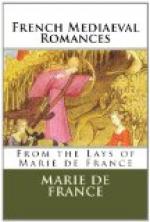The husband of the lady presently took notice of the change in his wife’s fashion and person. He was troubled in his soul, and misdoubting his sister, took her apart to reason with her on a day. He told her of his wonder that his dame arrayed her so sweetly, and inquired what this should mean. The crone answered that she knew no more than he, “for we have very little speech one with another. She sees neither kin nor friend; but, now, she seems quite content to remain alone in her chamber.”
The husband made reply,
“Doubtless she is content, and well content. But by my faith, we must do all we may to discover the cause. Hearken to me. Some morning when I have risen from bed, and you have shut the doors upon me, make pretence to go forth, and let her think herself alone. You must hide yourself in a privy place, where you can both hear and see. We shall then learn the secret of this new found joy.”
Having devised this snare the twain went their ways. Alas, for those who were innocent of their counsel, and whose feet would soon be tangled in the net.
Three days after, this husband pretended to go forth from his house. He told his wife that the King had bidden him by letters to his Court, but that he should return speedily. He went from the chamber, making fast the door. His sister arose from her bed, and hid behind her curtains, where she might see and hear what so greedily she desired to know. The lady could not sleep, so fervently she wished for her friend. The knight came at her call, but he might not tarry, nor cherish her more than one single hour. Great was the joy between them, both in word and tenderness, till he could no longer stay. All this the crone saw with her eyes, and stored in her heart. She watched the fashion in which he came, and the guise in which he went. But she was altogether fearful and amazed that so goodly a knight should wear the semblance of a hawk. When the husband returned to his house—for he was near at hand—his sister told him that of which she was the witness, and of the truth concerning the knight. Right heavy was he and wrathful. Straightway he contrived a cunning gin for the slaying of this bird. He caused four blades of steel to be fashioned, with point and edge sharper than the keenest razor. These he fastened firmly together, and set them securely within that window, by which the tercel would come to his lady. Ah, God, that a knight so fair might not see nor hear of this wrong, and that there should be none to show him of such treason.
On the morrow the husband arose very early, at daybreak, saying that he should hunt within the wood. His sister made the doors fast behind him, and returned to her bed to sleep, because it was yet but dawn. The lady lay awake, considering of the knight whom she loved so loyally. Tenderly she called him to her side. Without any long tarrying the bird came flying at her will. He flew in at the open window, and was entangled amongst the blades of steel. One blade pierced his body so deeply, that the red blood gushed from the wound. When the falcon knew that his hurt was to death, he forced himself to pass the barrier, and coming before his lady fell upon her bed, so that the sheets were dabbled with his blood. The lady looked upon her friend and his wound, and was altogether anguished and distraught.




